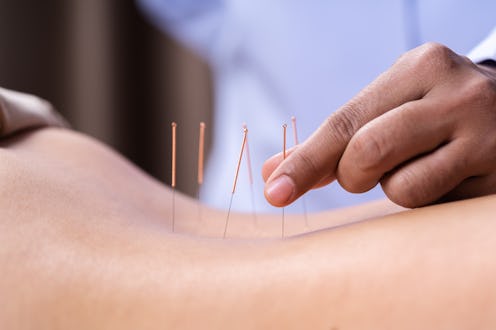Life
Experts Explain What Acupuncture Can & Can’t Do For Depression

Acupuncture, which uses needles to target particular pressure points on the body, has been used for thousands of years to help a range of conditions, from migraines, to infertility, to stress. Some practitioners say it can also help with symptoms of depression as a results of its effects on stress. Scientific evidence, though, suggests that using acupuncture for depression might be helpful in combination with other treatments, but can't ease symptoms all on its own. Basically, if your best friend's cousin's girlfriend insists that she did nothing except acupuncture and her depression cleared all by itself, you might not want to take her word for it.
The theory behind acupuncture is that the body has pressure points that can help with conditions like migraine when they're targeted, either by pins or pressure. "There are acupuncture points all around the body on the meridian lines that have different uses and effects," licensed acupuncturist Joel Granik tells Bustle. "The points help balance the body’s energy flow."
There's evidence to support this: what's known as energy flow might be stimulation of the nervous system, creating a calming effect. Some doctors believe that acupuncture pressure points can stimulate the body's pain relief system, helping you feel better during the treatment. Granik says the point known as Stomach 26, or Zusanli, to help produce these effects. "It's located about 3 to 4 inches below the knee and half an inch to the outside of your shin bone," he says. The point called Heart 7, or Spirit Gate, on the outside of the wrist is meant to help with irritability.
Dr. Josh Klapow Ph.D, a clinical psychologist, tells Bustle that acupuncture can be a helpful adjunctive treatment for depression because it can reduce muscle tension, soothe the central nervous system, and improve your mood. It's also an excellent way to take time out of your day for yourself. However, Dr. Klapow says that studies have found that acupuncture isn't an effective primary treatment for depression. Primary treatments are the treatments people turn to first, as they have the best demonstrated ability to help ease symptoms and cure conditions. For depression, these include talk therapy, cognitive behavioral therapy, antidepressants, and others. An acupuncture practice may not treat depression on its own, but it might be helpful if you find yourself calmer and happier after a session. (If you hate needles, it might not be for you.)
Many studies have been done to assess acupuncture's possible effect on depression, but if you see a splashy headline declaring that research has "proven" that acupuncture can help depressive symptoms, it's important to read between the lines. One review of 64 different studies involving over 7,000 people, published in The Cochrane Database for Systemic Review in 2018, found that there's "low-quality evidence" linking acupuncture to any helpful role in depression treatment. The researchers behind the review wrote that studies showed a lot of variation in acupuncture techniques and types of depression, and that many had a high risk of "performance bias," meaning participants getting acupuncture got more attention and care from scientists than control groups who didn't. They suggested more research is needed to thoroughly look at this link.
Some of the research around acupuncture and depression has found positive results. A review study published in the British Journal of Midwifery in 2018 looked at 1,592 studies of depression and acupuncture to see if there was evidence that acupuncture might help postpartum depression (PPD). Only three studies fit the bill, and only one of those three showed that acupuncture might be as effective as the antidepressant fluoxetine hydrochloride (Prozac) for treating PPD. The other two studies didn't show much difference, but it certainly didn't seem as if acupuncture did any harm.
If you want to use acupuncture to help your mental health symptoms, experts tell Bustle, go for it — as long as you're getting other treatments, too. Acupuncture might help you relieve stress, feel more grounded in your body, and encourage you to stop ruminating. All of those effects can indirectly help with depressive symptoms. However, it might be a good idea to look into cognitive behavioral therapy, which has been shown to be particularly helpful in dealing with depression, talk to your therapist about antidepressants, and fit in an acupuncture appointment in between.
If you or someone you know is seeking help for mental health concerns, visit the National Alliance on Mental Illness (NAMI) website, or call 1-800-950-NAMI(6264). For confidential treatment referrals, visit the Substance Abuse and Mental Health Services Administration (SAMHSA) website, or call the National Helpline at 1-800-662-HELP(4357). In an emergency, contact the National Suicide Prevention Lifeline at 1-800-273-TALK(8255) or call 911.
Studies cited:
David, D., Cristea, I., & Hofmann, S. G. (2018). Why Cognitive Behavioral Therapy Is the Current Gold Standard of Psychotherapy. Frontiers in psychiatry, 9, 4. doi:10.3389/fpsyt.2018.00004
Komori, A., Arthur, D., Radford, S., Tan, H. Y., Zheng, L., An, M., … Zheng, Z. (2018). Acupuncture versus antidepressants in the management of postpartum depression: A systematic review. British Journal of Midwifery, 26(10), 670–681. doi: 10.12968/bjom.2018.26.10.670
Napadow, V., Beissner, F., Lin, Y., Chae, Y., & Harris, R. E. (2020). Editorial: Neural Substrates of Acupuncture: From Peripheral to Central Nervous System Mechanisms. Frontiers in Neuroscience, 13. doi: 10.3389/fnins.2019.01419
Smith, C. A., Armour, M., Lee, M. S., Wang, L. Q., & Hay, P. J. (2018). Acupuncture for depression. The Cochrane database of systematic reviews, 3(3), CD004046. doi:10.1002/14651858.CD004046.pub4
Experts:
Joel Granik, licensed acupuncturist
Dr. Josh Klapow Ph.D, clinical psychologist
This article was originally published on